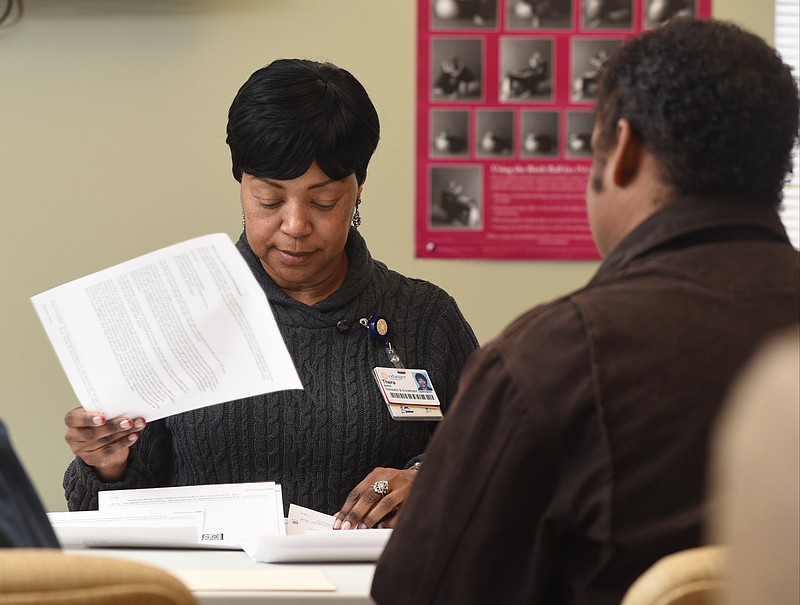With Affordable Care Act marketplace enrollment numbers up from last year in both Tennessee and Georgia, the new system for buying health insurance seems to have moved past "flash-in-the-pan" and more toward "fixture" status.
But legal and political uncertainty over the marketplace's future in both states means that no one -- enrollees, advocates and health insurers alike -- can get comfortable quite yet.
Sunday was the busiest day ever for HealthCare.gov sign-ups, as a surge of shoppers rushed to buy health insurance plans before the midnight open enrollment deadline, federal officials said Wednesday.
SPECIAL ENROLLMENT PERIOD
While open enrollment is over, the federal government is allowing a special enrollment period for people who were stuck "in line" leading up to the deadline, either through technical difficulties or long waits. Those people will have until Feb. 22 to complete their enrollment. Visit HealthCare.gov or call the Marketplace Call Center at 800-318-2596 (TTY 1-855-889-4325) to find out if you qualify.
At the day's close, 229,093 Tennesseans and 536,929 Georgians had either enrolled or been automatically re-enrolled in a plan from the health insurance marketplace over the three-month open enrollment period. Nationwide, about 11.4 million Americans selected marketplace plans or were automatically re-enrolled -- though the administration has not yet broken down the numbers to show how many are new buyers and how many are repeat customers.
Those numbers are up from 151,352 Tennessee sign-ups during the last enrollment period, and 316,543 sign-ups in Georgia. And the majority of those who signed up received subsidies to help them pay for premiums.
On Wednesday, U.S. Department of Health and Human Services Secretary Sylvia Burwell said the growing numbers prove that the health reform law is "now an important part of the everyday lives of millions of Americans." And in a conference call with reporters, Marketplace CEO Kevin Counihan said the response "clearly validates" that shoppers have found the products on the marketplace valuable.
"We're now getting ready for the fall and open enrollment 2016," Counihan said.
But what that enrollment will look like has been called into question by the looming U.S. Supreme Court case King vs. Burwell -- which health policy experts have said could gut the marketplace for states like Tennessee and Georgia.
The Supreme Court is poised to hear arguments next month in the case, which concerns enrollees in the 37 states that opted not to create their own state-based insurance marketplaces and instead rely on the federal exchanges.
The central question hinges on whether the Affordable Care Act allows tax subsidies for people buying through federal exchanges, or if that assistance was meant only for people buying through state-based exchanges.
In Tennessee alone, 82 percent of new marketplace enrollees qualified for a tax credit as of Jan. 31, while 90 percent of all shoppers in Georgia qualified for assistance.
A poll released last month by the Kaiser Family Foundation found that few people were paying attention to the Supreme Court case; 64 percent said Congress should pass a law so people in all states are eligible for financial help. Meanwhile, 59 percent said their state should create its own marketplace to avoid the potential disparity.
But some Tennessee lawmakers opposed to the Affordable Care Act are seeking to do away with that possibility of a Plan B.
Sen. Brian Kelsey, R-Germantown, and Rep. Jeremy Durham, R-Franklin, have filed a bill that would prohibit the state from creating its own exchange in the event that the Supreme Court rules against the federal exchange subsidies.
Kelsey could not be reached for comment Wednesday, but he told The Tennessean in an earlier statement that the bill is meant to keep the state "from operating any ObamaCare exchanges in the future."
"We recognize there is a problem with health care in this country but we want to go a different direction," Kelsey told the newspaper, adding he supports a private marketplace that is not affiliated with the government.
Kelsey was one of seven senators on a legislative committee who voted against Gov. Bill Haslam's Insure Tennessee program, which was designed to expand Medicaid to approximately 280,000 people under the Affordable Care Act.
The bills to prohibit a state-based exchange, Senate Bill 72 and House Bill 61, are scheduled to be heard in committee.
Contact Kate Belz at kbelz@timesfreepress.com or 423-757-6673.
